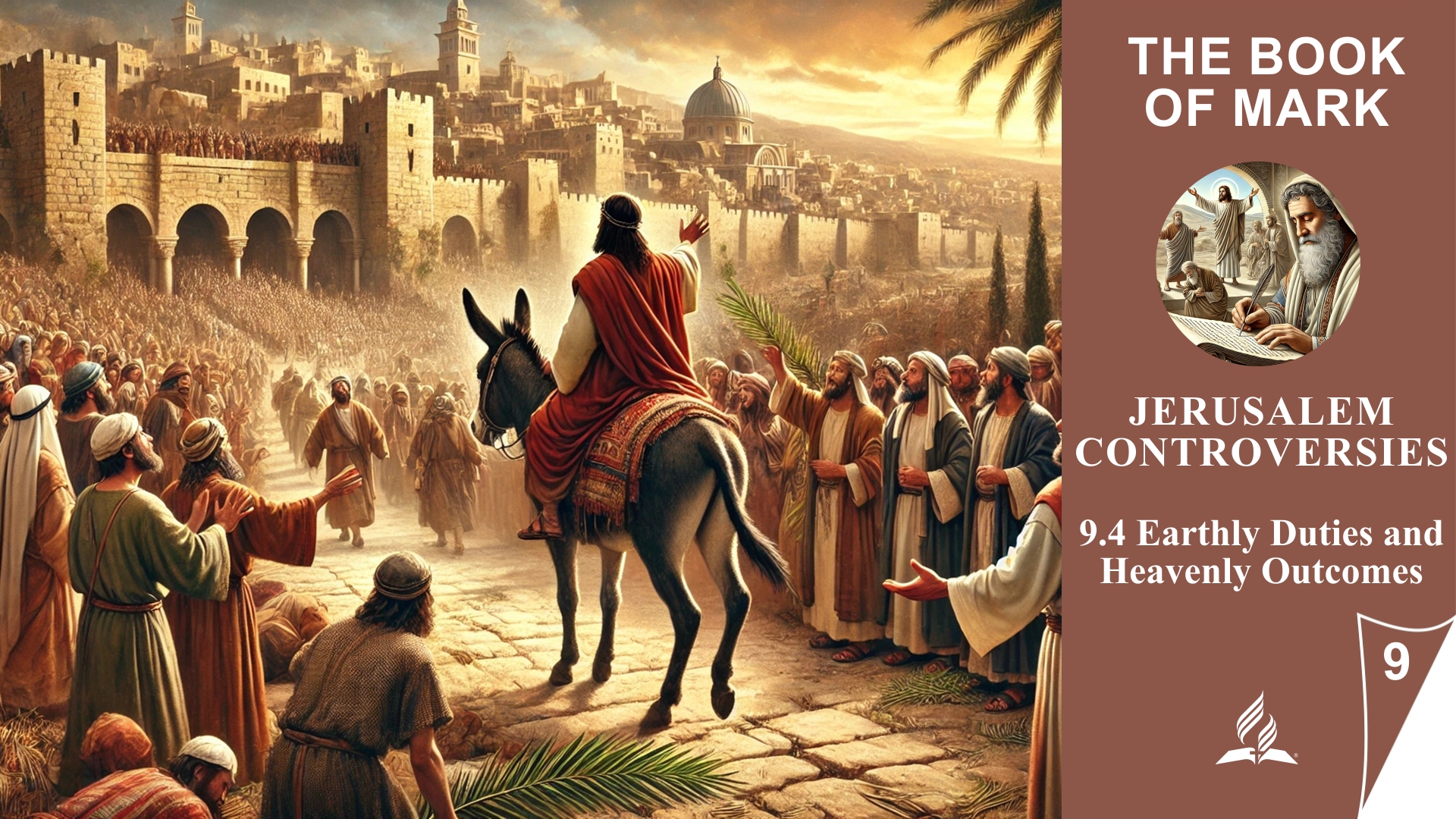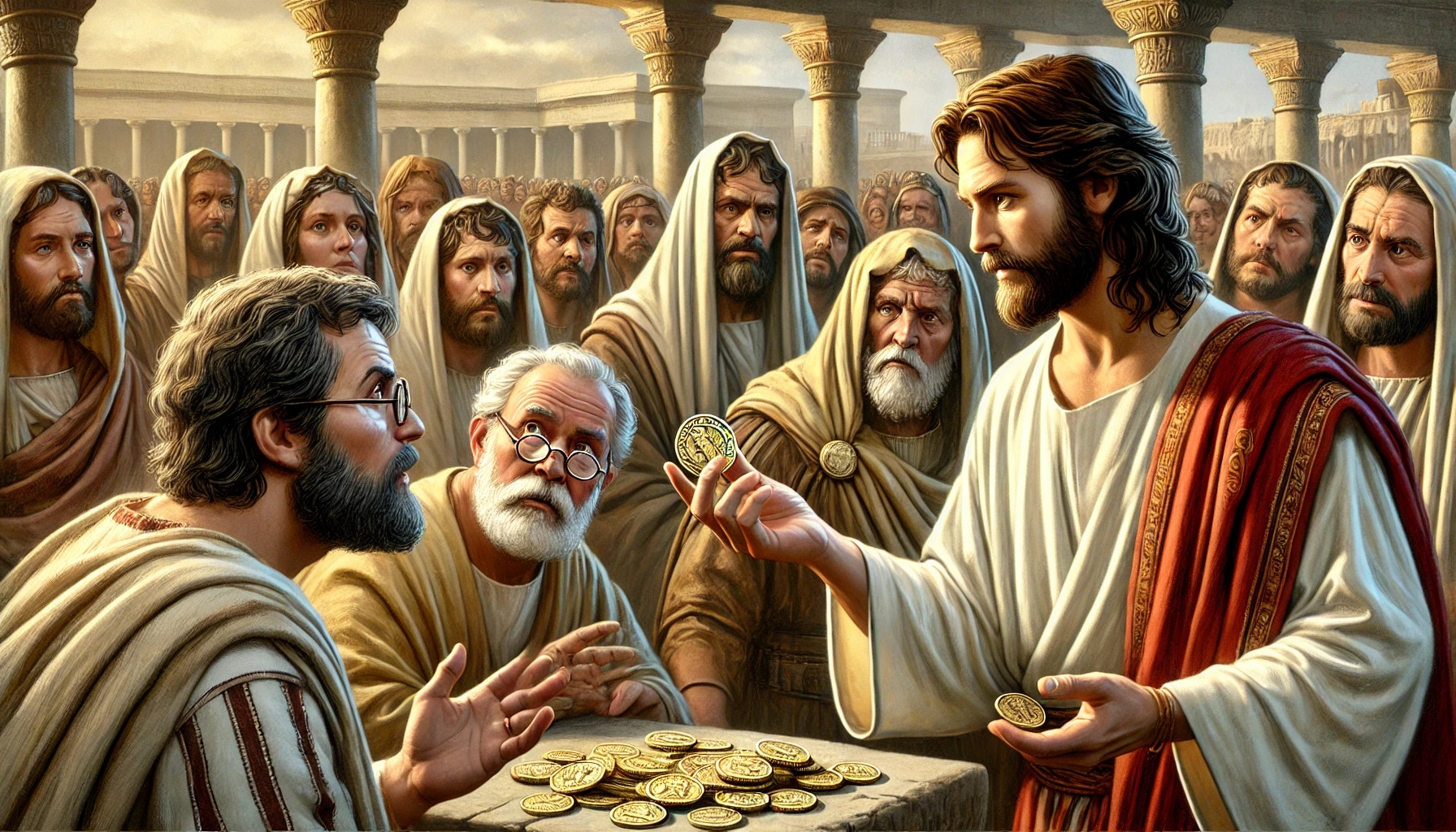


9.4 Earthly Duties and Heavenly Outcomes
Taxes and Resurrection: Jesus’ Wisdom in the Face of Worldly and Spiritual Challenges
Read Mark 12:13–27. What happens here, and what does Jesus teach?
In Mark 12:13–27, Jesus encounters religious leaders again, who attempt to trap Him with difficult questions. First, the Pharisees and Herodians ask Him about paying taxes to the Roman emperor, hoping to anger either the Roman authorities or the Jewish people. Jesus’ response is both wise and profound: “Give to Caesar what is Caesar’s, and to God what is God’s.” With this answer, Jesus shows that while we should fulfill our earthly duties, they should not conflict with our higher spiritual obligations. He teaches that as believers, we must adhere to our civic responsibilities while remaining faithful to God, with our loyalty to God always taking precedence.
Next, the Sadducees approach Jesus with a hypothetical question about the resurrection, intending to discredit the teaching of resurrection. They construct an absurd scenario to ridicule the concept of resurrection. Jesus responds with a profound truth: In heaven, earthly institutions like marriage will no longer exist, as life after resurrection will be of a different, higher nature. Moreover, Jesus uses the Scriptures, which the Sadducees also accept, to defend the truth of the resurrection. He refers to God’s self-revelation as the God of Abraham, Isaac, and Jacob, emphasizing that God is a God of the living, not of the dead. This implies that the patriarchs will live on in the resurrection.
This passage teaches us that our faith has significance both in this world and in the coming one. We are to fulfill our earthly duties conscientiously while keeping our eternal, spiritual truths and our faithfulness to God in view. Jesus shows us that our hope extends beyond this life and that our relationship with God will find its fulfillment in the resurrection. This reminds us that our heavenly destiny should shape our actions and thoughts in this world.
If someone were to ask you, “Do you know the power of God?” how would you respond and why?
If someone asked me, “Do you know the power of God?” I would respond, “Yes, I know it because I have experienced it in my life and in the world around me.”
I would say this because I have witnessed God’s power in various forms—whether through creation surrounding us, answered prayers, the impact of His Word in my life, or the transformation of hearts and lives made possible only by His love and grace.
God’s power is evident in His ability to make the impossible possible, in His infinite wisdom governing the world, and in His mercy that can heal even the most broken heart. These experiences and insights give me confidence that God’s power is real and omnipresent, both in grand miracles and in the everyday grace He bestows upon us.
The lesson from Mark 12:13–27 offers valuable connections to our daily life and faith by showing how we as Christians should live in a world that presents both worldly and spiritual challenges.
-
Balancing Earthly Duties with Spiritual Priorities: Jesus teaches us that it is important to fulfill our earthly duties—whether paying taxes or following laws—as long as these do not contradict our higher obligation to God. This lesson reminds us that while we live in and are part of this world, our loyalty to God must always come first. In our daily lives, this means acting responsibly in our work, family, and society, while keeping God’s values and commandments in view.
-
Understanding God’s Power and Hope for the Eternal: The question about the resurrection shows that our faith is relevant not just for this life but also for what comes after death. Jesus’ teaching about the resurrection encourages us to expand our perspective on life beyond the earthly. This has practical implications for our daily lives as it reminds us that our decisions and actions in this world have both temporary and eternal significance. Our hope in the resurrection and eternal life should shape our thinking, behavior, and priorities.
-
Experiencing God’s Power in Daily Life: When reflecting on God’s power, we should recognize that it is not only visible in grand miracles or extraordinary events but also in the everyday experiences of our lives. Whether through prayer, studying His Word, or experiencing His creation—God’s power is constantly at work in and around us. This understanding strengthens our trust and helps us rely on God even in difficult situations, knowing that His power is greater than any earthly challenge.
In summary, this passage encourages us to lead lives that meet both the demands of this world and the expectations of God. It reminds us that our faith is relevant not just for Sundays but for every day and every decision. By fulfilling our earthly duties and simultaneously trusting in God’s power and eternal promises, we can live a life that honors God and prepares us for our heavenly destiny.
Give to Caesar what is Caesar’s, and to God what is God’s—because our highest loyalty always belongs to God.
(Visited 11 times, 1 visits today)






















